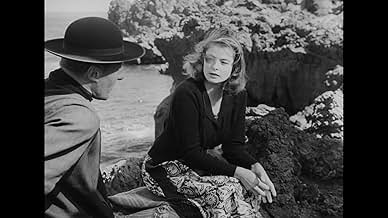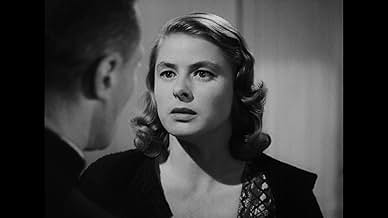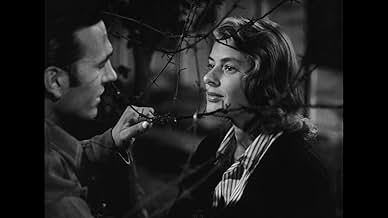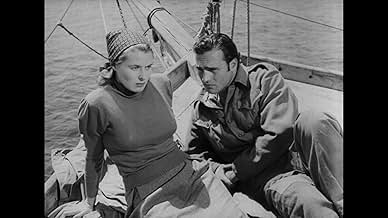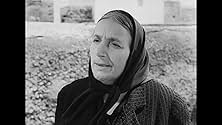AVALIAÇÃO DA IMDb
7,2/10
8,6 mil
SUA AVALIAÇÃO
Karin, uma jovem mulher báltica, casa-se com o pescador Antonio para escapar de um campo de prisioneiros. Mas não se pode habituar à vida dura da aldeia de Antonio, ameaçada pelo vulcão Stro... Ler tudoKarin, uma jovem mulher báltica, casa-se com o pescador Antonio para escapar de um campo de prisioneiros. Mas não se pode habituar à vida dura da aldeia de Antonio, ameaçada pelo vulcão Stromboli.Karin, uma jovem mulher báltica, casa-se com o pescador Antonio para escapar de um campo de prisioneiros. Mas não se pode habituar à vida dura da aldeia de Antonio, ameaçada pelo vulcão Stromboli.
- Direção
- Roteiristas
- Artistas
- Prêmios
- 2 vitórias e 1 indicação no total
Gaetano Famularo
- Man with Guitar
- (não creditado)
Angelo Molino
- Child
- (não creditado)
Roberto Onorati
- Man
- (não creditado)
Avaliações em destaque
I know the Sight And Sound crowd loves it but I find it highly resistible for the same reason they venerate it, namely that watching an hour and forty minutes of Ingrid Bergman's spirit, individuality and, yes, arrogance crushed beneath the heel of complacent Italian peasantry is less than enthralling. Partially making up for this are Rossellini's three visually arresting set pieces, the Catching Of The Tuna and the Volcanic Eruptions. And of course Bergman is captivating, as usual. So, let's give it a B minus. PS...As wonderful as is the cinematography the sound sucks. Could maybe understand 60% of the English dialogue.
Rossellini's "Stromboli, terra di Dio" is a film on the line between fiction and reality more than usual for the acclaimed director. Most of the central part, where Karin just lives in Stromboli and complains about stuff was not written as in a normal screenplay: Rossellini chose possible elements of the environment or popular habits and filmed them in the movie, putting Karen in it like an extrernal observator. This has a double effect: neorealism comes to some of its highest achievements (like the tuna fishing and the eruption of the volcano) but to the loss of a fantastic actress such as Ingrid Bergman, who always feels out of place. Careful: I didn't say KAREN, I said BERGMAN. Because as a character she should be out of place, and she is even esthetically: she's always combed and white as the moon, while the inhabitants are rusty and dirty. But the actress herself is out of place in this film, and that is not a good thing at all. Her lines are dumb, repetitive, and Bergman actually did a great job managing to not disappear in such irrelevance. She still lives the scene, but her attempt is clearly forced into a new, uncharted territory as was Italian filmmaking for an American diva. We could say then that Ingrid is just as lost as her character.
What I just can't stand in this film is the necessity of squeezing the religious conversion (I'm talking about the Italian version of the film, American and International versions have slightly different endings for that time's commercial policies). It was the result of Rossellini's collaboration with powerful politicians and Church men, to be specific Giulio Andreotti and Felix Morlion, whose intention was to use a critically acclaimed author's cinema for political propaganda. I hate when other interests interfere with artistic purposes, and here the last moments are definitely flawed with an out of the blue realization of the power and existence of God for no good reason.
As I said before, neorealist features are what makes this film enjoyable and a classic. Apart from the brilliant scenes I mentioned above, I really liked the harsh depiction of the patriarchy that unfortunately still exists and thrives especially in the South of Italy. I actually felt bad and angry at Antonio as he jerks his wife with no respect and beats her like an animal, but I know very well that even today that is the norm in so many families and that simply pisses me off. Kudos to Rossellini for depicting that so realistically, but then again he's a great director exactly because of scenes like those.
What I just can't stand in this film is the necessity of squeezing the religious conversion (I'm talking about the Italian version of the film, American and International versions have slightly different endings for that time's commercial policies). It was the result of Rossellini's collaboration with powerful politicians and Church men, to be specific Giulio Andreotti and Felix Morlion, whose intention was to use a critically acclaimed author's cinema for political propaganda. I hate when other interests interfere with artistic purposes, and here the last moments are definitely flawed with an out of the blue realization of the power and existence of God for no good reason.
As I said before, neorealist features are what makes this film enjoyable and a classic. Apart from the brilliant scenes I mentioned above, I really liked the harsh depiction of the patriarchy that unfortunately still exists and thrives especially in the South of Italy. I actually felt bad and angry at Antonio as he jerks his wife with no respect and beats her like an animal, but I know very well that even today that is the norm in so many families and that simply pisses me off. Kudos to Rossellini for depicting that so realistically, but then again he's a great director exactly because of scenes like those.
I enjoyed reading "erupting beauty" (The Big Combo, 2 February 2004) for a good summary of Stromboli. Zetes ("A vastly underrated masterpiece", zetes from Saint Paul, MN, 15 June 2002) and bkoganbing ("Ingrid and the volcano", bkoganbing from Buffalo, New York, 29 August 2012) both include good background about the controversies surrounding it. Cogs ("Poor old Ingrid!!", cogs from London, England, 2 February 2005) sees similarities between Rossellini and Bresson that I share. I agree with Cogs that Bresson is more interesting.
Stromboli is a showcase for Ingrid Bergman, who to my mind is easily the greatest actress in cinema. Karen's situation is Hellish. She marries to escape an Italian interment camp. She subsequently finds only misery with the desolate volcano-island that her fisherman-husband takes her to. The terrain is harsh and the locals are even worse. She discovers him to be overly simple and occasionally too beastly to bear. The finale reflects her desire for just a meager amount of happiness in such a world as this.
Visually Roberto Rossellini is superb. His visual aesthetics are unsentimental but never boring. His camera work is unobtrusive.
Two of the most memorable scenes feature a disturbing quotient of animal cruelty. In the first scene, a live rabbit is needlessly sacrificed by being placed near a ferret. Rossellini couldn't use stuffed animals. He has the audience, some of whom are animal lovers, suffer by showing the kill in detail. Of course, Rossellini is strengthening the distance between Ingrid and her fisherman husband, and identifying her with the suffering rabbit. However, I won't give Rossellini any credit for moving the story along with this thoughtless tactic.
The second scene is the justifiably famous tuna slaughter with real fisherman, nets and spears. I have eaten tuna all my life and haven't thought much where it comes from. Also, I have no doubt that all of the tuna that we see being harvested was ultimately eaten. To give Rossellini credit, he filmed it well--with Ingrid nearby witnessing it as if she was one of the unfortunate fish. I just don't think that it takes great storytelling skill to rely on animal slaughter to move an audience.
Two other scenes that are noteworthy is when Karen attempts to seduce a priest, and when she (apparently) seduces a lighthouse keeper. The character that Rosselini and Bergman are portraying is flawed, and very human. She's no saint, she's a woman with unfulfilled needs.
Overall, Stromboli is a must-see member of the Italian neo-realism canon. Very few films venture to depict life without false pretenses. Ingrid's Karen really suffers; and her actions make her a polarizing figure to viewers, isolating her further. Rossellini and Bergman are showing what life is really like as every member of the audience understands it.
Stromboli is a showcase for Ingrid Bergman, who to my mind is easily the greatest actress in cinema. Karen's situation is Hellish. She marries to escape an Italian interment camp. She subsequently finds only misery with the desolate volcano-island that her fisherman-husband takes her to. The terrain is harsh and the locals are even worse. She discovers him to be overly simple and occasionally too beastly to bear. The finale reflects her desire for just a meager amount of happiness in such a world as this.
Visually Roberto Rossellini is superb. His visual aesthetics are unsentimental but never boring. His camera work is unobtrusive.
Two of the most memorable scenes feature a disturbing quotient of animal cruelty. In the first scene, a live rabbit is needlessly sacrificed by being placed near a ferret. Rossellini couldn't use stuffed animals. He has the audience, some of whom are animal lovers, suffer by showing the kill in detail. Of course, Rossellini is strengthening the distance between Ingrid and her fisherman husband, and identifying her with the suffering rabbit. However, I won't give Rossellini any credit for moving the story along with this thoughtless tactic.
The second scene is the justifiably famous tuna slaughter with real fisherman, nets and spears. I have eaten tuna all my life and haven't thought much where it comes from. Also, I have no doubt that all of the tuna that we see being harvested was ultimately eaten. To give Rossellini credit, he filmed it well--with Ingrid nearby witnessing it as if she was one of the unfortunate fish. I just don't think that it takes great storytelling skill to rely on animal slaughter to move an audience.
Two other scenes that are noteworthy is when Karen attempts to seduce a priest, and when she (apparently) seduces a lighthouse keeper. The character that Rosselini and Bergman are portraying is flawed, and very human. She's no saint, she's a woman with unfulfilled needs.
Overall, Stromboli is a must-see member of the Italian neo-realism canon. Very few films venture to depict life without false pretenses. Ingrid's Karen really suffers; and her actions make her a polarizing figure to viewers, isolating her further. Rossellini and Bergman are showing what life is really like as every member of the audience understands it.
I wanted to take the time to write of this work by my grandparents Rossellini and Bergman, as it has always been a film of both great emotion and confusion for me personally. If anything, there is much to be said for my grandmother moving from Hollywood to a deserted volcanic island with meager means and low production capacity. This speaks to her love not only of my grandfather's work, but also to her sense of adventure and courage, looking for new ways to express herself as an actress. When it comes to my grandfather, this is his most impulsive directorial work. He was in a both stressful and joyous time in his life and i can only imagine the feelings of both anguish and happiness that he felt. All of these swirls and jests of emotion are apparent, they are as evident as the very powerful setting itself. Though the film is certainly not perfect, and at times even slow and overtly dramatic, it is nonetheless sincere and beautiful. It is a work of love made by two people in love.
"La terra e dura qui." Ingrid Bergman is a powerhouse in this film (perhaps out of love and devotion to the director), but she still can't match the power of the menacing volcano on this remote island off the coast of Italy. Bergman plays a prisoner of war with a checkered past stuck in a women's camp, who marries a Strombolian in order to provide herself with the security she needs. Trouble awaits her, and the first sign we get of that is when she starts to complain of being cold on the boat that is taking her to her new life. What she finds is not up to her high Continental standards, and her attitudes towards the locals and the place itself diminish her already low stature as an outsider. It is less the people however, than the general character of the place that turns her off. The volcano, unnamed by the villagers, always awaits in the background, and setting itself becomes one of the main characters (thus the importance of the title), a force to be reckoned with, much like her character.
Although this film is not noir in any way, and Rossellini himself would probably turn in his grave for hearing me say this, Bergman's character certainly does not hesitate in using her female "wiles" to get what she wants and needs. She survived a world war on what we take are wits and flexible morals, so she will also make it through this and I love her for it.
She even attempts to seduce the local priest by cooing "I knew you were the only person who could help me." Having that attempt fail, she tries with the village lighthouse keeper seen at right, and I don't even have to explain the power of her touch. As she asks for help to escape from the village, she softly touches his foot with hers, and creates an unbelievably palpable feeling of erotic energy, something unheard of in mainstream movies today. I know, that's such a cliché, but it's true.
Anyway, I won't discuss the ending, which angered me as a modern woman (even Bergman didn't seem to be buying it), but I will say that the film impressed me with its use of setting comprising plot, character, mise-en-scene, and theme. The film IS setting. It's also worth it just to see the non-actors performing a yearly tuna fishing ritual that dates back to the Phoenecians. Rossellini films are never just stories, they are historical documents. And I love him for that.
cococravescinema.blogspot.com
Although this film is not noir in any way, and Rossellini himself would probably turn in his grave for hearing me say this, Bergman's character certainly does not hesitate in using her female "wiles" to get what she wants and needs. She survived a world war on what we take are wits and flexible morals, so she will also make it through this and I love her for it.
She even attempts to seduce the local priest by cooing "I knew you were the only person who could help me." Having that attempt fail, she tries with the village lighthouse keeper seen at right, and I don't even have to explain the power of her touch. As she asks for help to escape from the village, she softly touches his foot with hers, and creates an unbelievably palpable feeling of erotic energy, something unheard of in mainstream movies today. I know, that's such a cliché, but it's true.
Anyway, I won't discuss the ending, which angered me as a modern woman (even Bergman didn't seem to be buying it), but I will say that the film impressed me with its use of setting comprising plot, character, mise-en-scene, and theme. The film IS setting. It's also worth it just to see the non-actors performing a yearly tuna fishing ritual that dates back to the Phoenecians. Rossellini films are never just stories, they are historical documents. And I love him for that.
cococravescinema.blogspot.com
Você sabia?
- CuriosidadesDuring production of this film, Ingrid Bergman entered into an extra-marital affair with Roberto Rossellini and became pregnant, the two eventually getting married and having three children. The resulting scandal in America effectively blacklisted her from the North American movie market and she was even condemned by politicians and religious figures. She was finally forgiven and welcomed back to America upon the success of Anastacia, a Princesa Esquecida (1956), but her Hollywood career was temporarily ended by this movie.
- Erros de gravaçãoThough used by women, pants were not so popular on that time. Is strange that a poor refugee like the character played by Bergman wears pants almost the entire movie.
- Cenas durante ou pós-créditosOpening credits: "I was found of them that sought me not; I was made manifest unto them that asked not after me." (New Testament, St. Paul's letter to the Romans, Chapter 10, Verse 20)
- Versões alternativasSeveral running times exist. The main difference between the 81 min. US version and the 105 min. Italian version was in the ending, with religious themes cut out.
- ConexõesEdited into Histoire(s) du cinéma: Une histoire seule (1989)
Principais escolhas
Faça login para avaliar e ver a lista de recomendações personalizadas
- How long is Stromboli?Fornecido pela Alexa
Detalhes
- Data de lançamento
- Países de origem
- Idiomas
- Também conhecido como
- Of God's Earth
- Locações de filme
- Empresas de produção
- Consulte mais créditos da empresa na IMDbPro
Bilheteria
- Orçamento
- US$ 1.000.000 (estimativa)
- Faturamento bruto mundial
- US$ 17.532
- Tempo de duração
- 1 h 47 min(107 min)
- Cor
- Proporção
- 1.37 : 1
Contribua para esta página
Sugerir uma alteração ou adicionar conteúdo ausente


